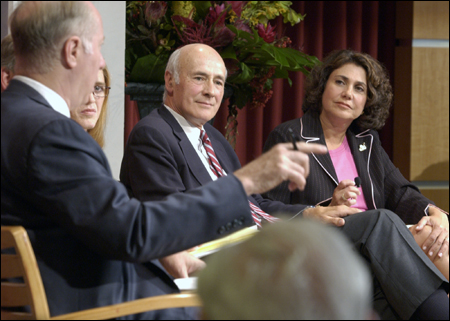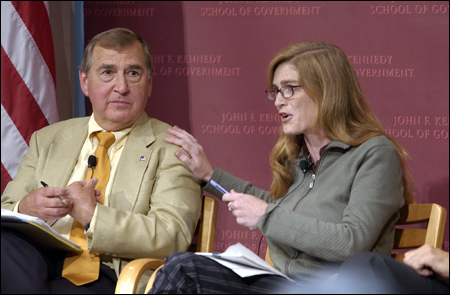Foreign policy future discussed
Harvard experts debate future paths

The familiar challenge of international terrorism will be central to the next president’s foreign policy agenda, but a panel of Harvard experts said that agenda will also include restoring America’s image abroad, a renewed focus on nuclear stockpile security, and relations with emerging superpower China.
Douglas Dillon Professor of Government and Belfer Center Director Graham Allison issued a stark warning about nuclear stockpile security, saying that he believes a nuclear attack by terrorists is “inevitable.”
“A nuclear 9/11, I believe, is a real possibility,” Allison said. “I believe it’ll happen within a decade.”
Unlike the intractability of the broader war on terrorism, Allison said the nuclear issue is solvable, by securing existing stockpiles, though not enough action has been taken.
Allison was one of five panelists who spoke at the Kennedy School of Government’s (KSG) John F. Kennedy Jr. Forum Tuesday (July 27). The discussion, moderated by Center for Public Leadership Director David Gergen, also included former KSG Dean and Sultan of Oman Professor of International Relations Joseph S. Nye Jr., lecturer in public policy Elaine Kamarck, who served as senior policy adviser to former Vice President Al Gore, and lecturer in public policy Samantha Power, whose 2002 book “A Problem From Hell: America and the Age of Genocide” won a Pulitzer Prize.
The discussion, “U.S. Foreign Policy in the Terrorism Age,” was timed to coincide with this week’s Democratic National Convention taking place at the FleetCenter in Boston, though the event itself was otherwise unconnected with the convention.
Several panelists put at the top of their agenda the task of restoring the United States’ reputation internationally, which panelists said has been damaged by handling of the War on Terror, as well as the pullout on several international agreements, such as the Kyoto Global Warming Accord.

But Power said the task isn’t as simple as making the United States rededicate itself to international organizations. The organizations themselves also need to regain legitimacy. In the developing world, Power said, international aid organizations are seen to have little more legitimacy than those sponsored by the U.S. government.
In revamping foreign policy with regards to foreign aid, Power said, a broader discussion has to occur so that the American public and institutions such as Congress agree with the thrust of U.S. action.
Nye characterized the current terrorism conflict as a “civil war within Islam” and said winning the war on terrorism will depend partly on influencing the large majority of Muslims who are sitting the current conflict out. That will take a greater emphasis on using America’s nonmilitary influence and the appeal of our ideals, which Nye terms “soft power,” than the current emphasis on military intervention.
“You can’t do it without winning the hearts and minds,” Nye said.
The 9/11 catastrophe illuminated failings in the American intelligence community, Kamarck said, that still need to be remedied. Kamarck said the next president will be faced with that difficult task, as well as with restructuring the U.S. military from an organization designed to fight large-scale wars to a more nimble force with more military police, for starters, that can have greater success at the smaller interventions that the United States is faced with.
Resolving nuclear concerns about North Korea and Iran will be other important items on the agenda, panelists said, as North Korea has shown itself willing to sell nuclear materials to third parties and Iran is developing nuclear capacity.
Though a Kerry administration would almost certainly look different than that of President Bush, Nye said a second Bush term would likely look different than his first.
Questions about whether the military efforts in Iraq under Bush were just a start of a new policy emphasizing military intervention have largely been answered, according to Nye. Nye said the difficulties encountered in Iraq have wrapped up so much military manpower that Bush has had no choice but to seek diplomatic alternatives for problems such as those presented by Iran and North Korea.
“Bush has been pushed toward multilateralism because there’s no good military options,” Nye said.
That military manpower shortage may have an effect on the coming presidential election, Kamarck said. Democrat leaders have been seeing a softening of support for Bush in rural areas, Kamarck said, possibly a result of the long overseas posting of national guardsmen and its effect on their families back home.
Gergen expressed frustration that, despite clear priorities, the candidates haven’t been more forthcoming about their foreign policy plans.
“I cannot remember a campaign where candidates have been as opaque as they have been about the future,” Gergen said. “It does seem that voters have the right, when they go to the polls, to cast their votes on more than a sniff.”




